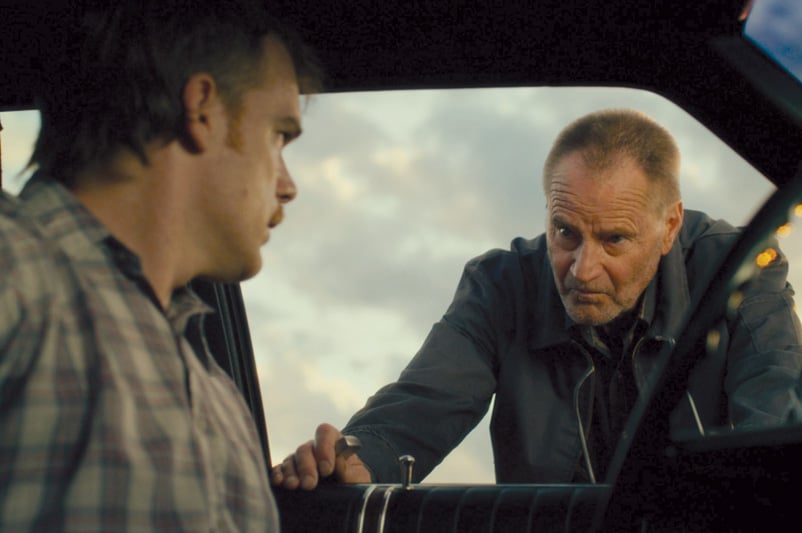
Cold in July is a Monstrous Mash-Up of Film’s Darkest Genres
A version of this story ran in the June 2014 issue.
Above: Michael C. Hall and Sam Shepard in Cold In July.
What they don’t tell you is that you have to clean it up yourself.
If you shoot a man in your living room—even if the man was an intruder, creeping around your house in the middle of the night looking to visit who knows what sort of mayhem upon you and your family; even if your house is located in East Texas, where shooting intruders is considered a God-given right; even if the cops eventually clear your name and the press declares you a hero—you’re still responsible for getting rid of the blood. Which means that the most traumatic night of your life is going to end with you scrubbing and mopping and pouring buckets full of bloody water into the toilet. And the next day will find you at the furniture store, shopping for a new couch. After every tragedy comes the inevitable banality.
This kind of juxtaposition, done right, can make for a perfectly unnerving cinematic moment. Especially in a thriller like Cold in July, which creates its feeling of danger and depravity by unapologetically mashing up genres and emotional tones. The movie is based on a 1989 novel by East Texas writer Joe R. Lansdale, who has never met a genre he couldn’t blow all to pieces (if you don’t believe me, check out Bubba Ho-Tep, his 1994 novella about an elderly Elvis and a black John F. Kennedy battling an Egyptian mummy at a nursing home). Over his 30-year career, Lansdale has written horror, crime, Westerns, young adult, even comics. Cold in July, like much of Lansdale’s work, is an emotionally and thematically scattershot affair—part horror film, part pitch-black comedy, part stalker thriller, part Southern noir, and part grindhouse revenge movie—and I mean that as a high compliment. Together, these elements add up to something brash and different. Because in Lansdale’s world, genre conventions don’t mean anything. The only thing that matters is the thrill.
Cold in July, which entered limited release in May, stars Michael C. Hall as Richard Dane, a family man whose world is turned upside-down after he kills an intruder and is then terrorized by the intruder’s father. The father, Ben Russel, played by Sam Shepard, has an air of supernatural evil about him. At one point he appears in Dane’s son’s room in a flash of lightning, only to disappear again, like some mythic demonic force. He’s as much the manifestation of Dane’s guilty conscience as anything else. Hall has said that he took the part of Dane because he wanted to play someone “normal” after portraying serial killer Dexter Morgan on the TV show Dexter for the previous six years. Which makes me wonder if he read the whole script before accepting the role, because Cold in July is about how quickly a “normal” man can turn into a killer under the strain of exceptional circumstance and increasingly close proximity to monsters.
Dane and Russel eventually join forces, taking up with a colorful private investigator named Jim Bob (played brilliantly by Don Johnson, who is in the midst of a quiet career renaissance) to track down the truth about the break-in. The journey takes them into a sordid underworld of corrupt cops, snuff porn and a shadowy organization called the Dixie Mafia—a world where the distinction between good guys and bad guys grows increasingly vague until morality becomes meaningless and pretty much everyone is just another guy with a gun. Soon the body count is rising and blood is splattering everywhere and Cold in July is careening from revenge film to Southern Gothic apocalypse—all of it pulpy and seedy and joyous in the extreme.
Cold in July may not be high art, but it triumphs because of the delight it takes in its own mad energy. In refusing to let itself be categorized or contained, it becomes a movie overflowing with the simple joy of being a movie. This is entertainment for entertainment’s sake, a midnight exercise in deviance, happily spitting in the face of rules and expectations and making it impossible for any reasonable movie lover to look away.


